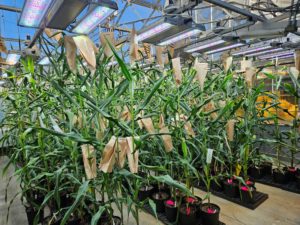
Tim Obitts, Alder Renewables; Alan Weber, MARC-IV; Alex Menotti, LanzaJet
Sustainable aviation fuel (SAF) was the topic of two panels at Monday’s
“2024 Ag & Food Policy Summit: Revitalizing Rural Revenues” in Washington D.C. and there was a lot of discussion surrounding the GREET model, changes in the RFS, carbon sequestration, corn ethanol, and new feedstocks.
Alder Renewables CEO Tim Obitts says agriculture holds the key to the future for SAF. “You are above ground oil wells,” said Obitts. His company’s technology can utilize a range of sustainable woody residues, agricultural byproducts, and next-generation energy crops like miscanthus to produce SAF.
Alan Weber has been involved in the biodiesel industry for over 30 years and as founding partner of MARC-IV he is excited about innovative new oilseeds like pennycress, camelina, and brasica carinata. “Each of them very unique in how they fit in a grower’s rotation but also similar in that they help to improve soil health and the second in that those crops are being grown on acres otherwise not in production.”
LanzaJet VP of Government Affairs Alex Menotti says getting the GREET model updated to include climate smart agriculture practices is only half the battle right now for getting corn ethanol to qualify for SAF. “The other half is EPA updating their own rules to recognize the climate benefits of corn ethanol and do things like enable CCS (carbon capture and storage) which is a key enabler for alcohol-to-jet,” said Menotti, who also noted that the top legislative priority for the industry right now is getting the IRA tax credits extended.
Listen to some of their discussion here:
Agri-Pulse Summit SAF Panel One 31:11

Kevin Welsh, Airlines for America; Gene Gebolys, World Energy; Amelia DeLuca, Delta Air Lines; and Dr. Patrick Gruber, Gevo
The second panel focused on the role of the airlines. “Sustainable aviation fuel is the only lever we have at this point to decarbonize,” said Amelia DeLuca, Chief Sustainability Officer, Delta Air Lines.
World Energy has been in advanced biofuels for over 25 years and is now on the forefront of SAF. “Ultimately, biofuels want to fly and the reason is, that’s where you can get the best value,” said CEO Gene Gebolys. “As we work to establish this market, it won’t be a SAF market, it will be a decarbonization market.”
The GREET model remains key to making it work. “If we’re getting paid for carbon abatement and it’s a virtual attribute, how the heck do you measure it? That’s where the GREET model comes in,” said Gevo CEO Dr. Patrick Gruber. “We like real data, real science, measured, reported, verified. That’s what we have to get to.”
The Ag and Food Policy Summit was a function of Agri-Pulse Communications.
Listen to the panel:
Agri-Pulse Summit SAF Panel Two 29:26
2024 Agri-Pulse Ag and Food Policy Summit Photo Album
 Nicholas Defenbaugh, a senior at Orion Technical College and a maintenance technician at Big River Resources, was one of eight students and young professionals who attended the recent 2024 National Ethanol Conference under the Robert Sather Memorial Scholarship program.
Nicholas Defenbaugh, a senior at Orion Technical College and a maintenance technician at Big River Resources, was one of eight students and young professionals who attended the recent 2024 National Ethanol Conference under the Robert Sather Memorial Scholarship program. 















